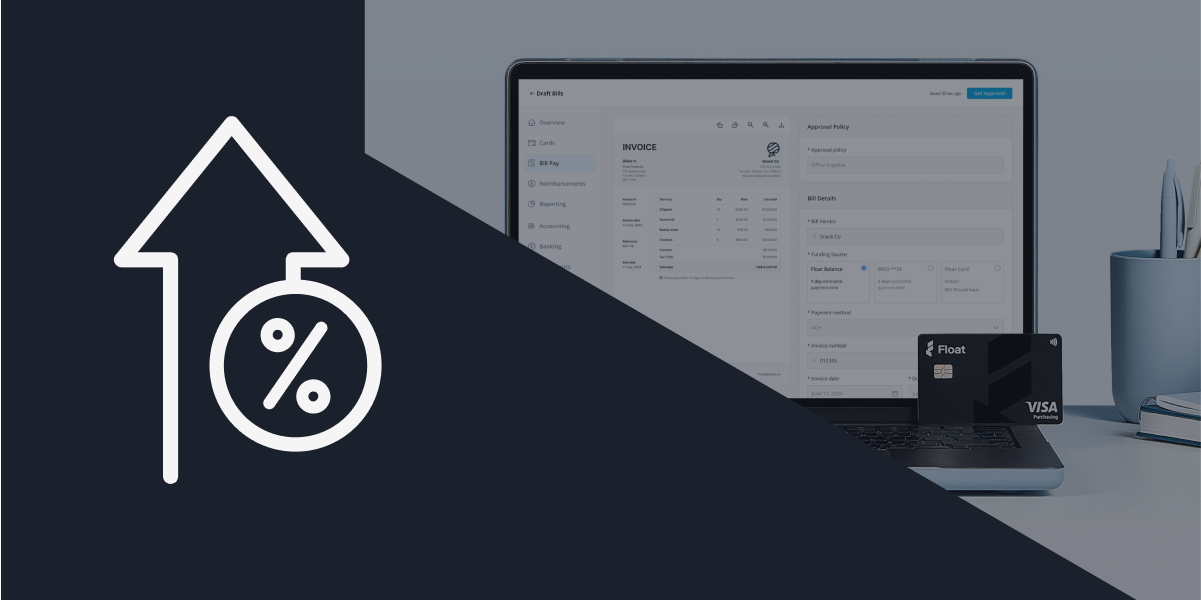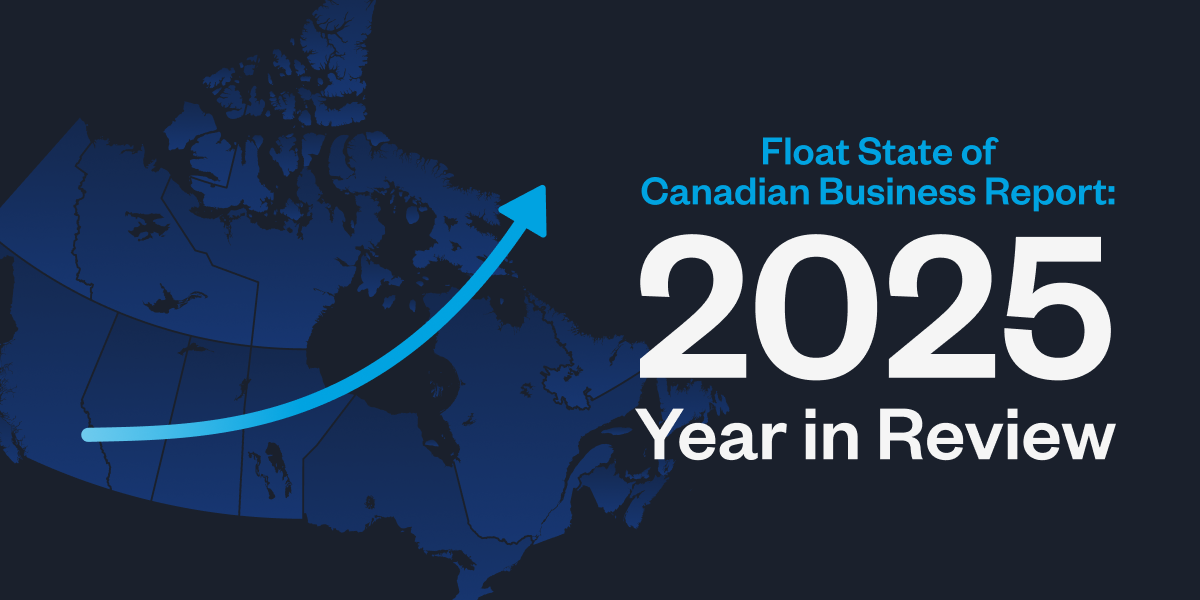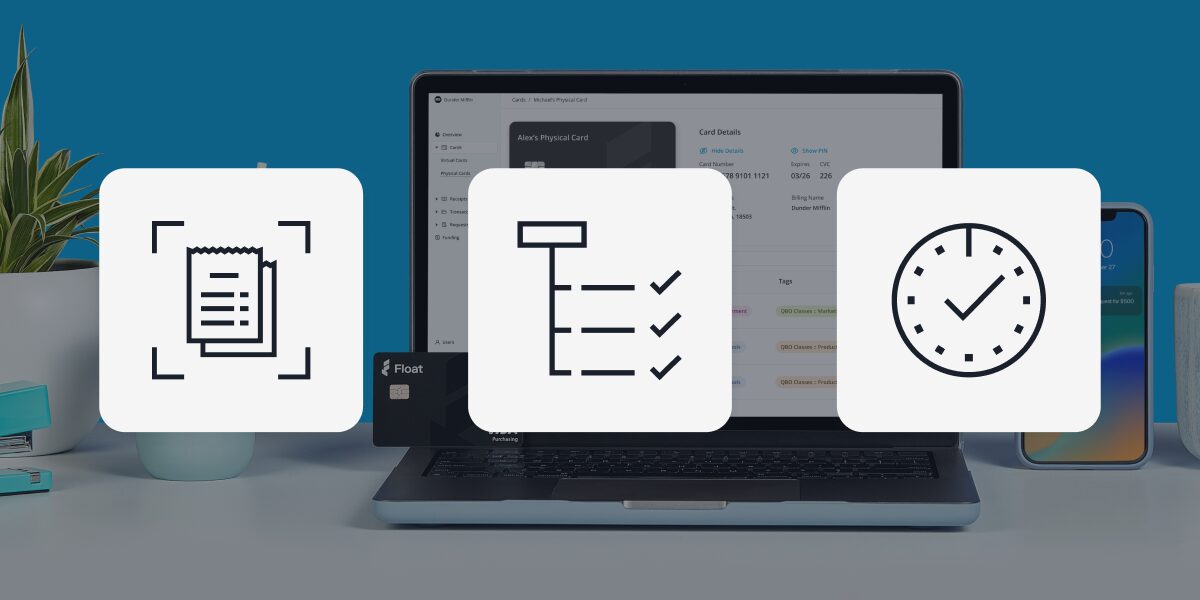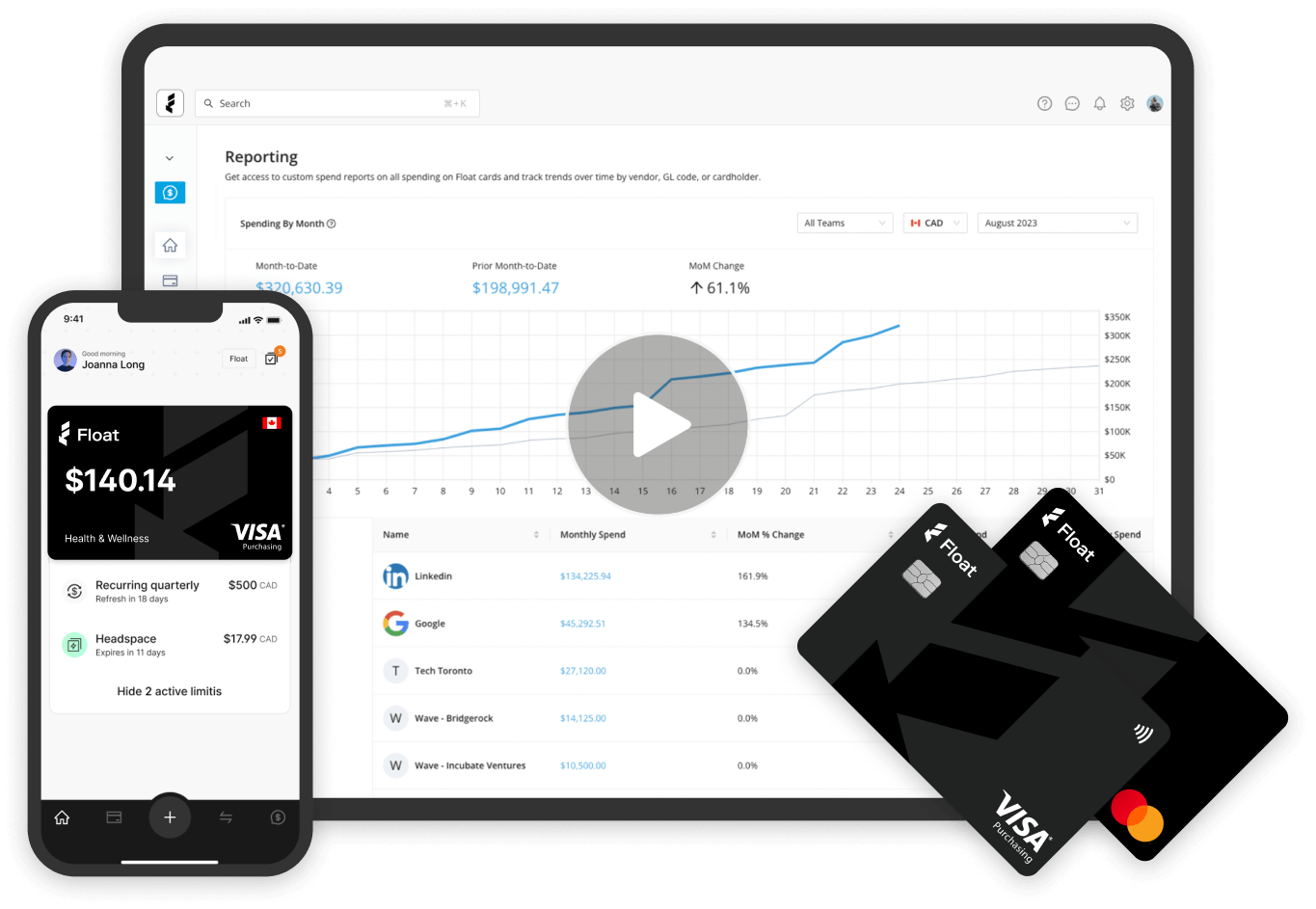Cash Flow Optimization
7 Best Business Accounts in Canada for 2026
Finding the best business account in Canada isn’t as simple as walking into your nearest branch. That’s where this guide comes in.
October 30, 2025

Finding the best business account in Canada isn’t as simple as walking into your nearest branch. Most accounts are designed with banks in mind, not businesses. They come with high monthly fees, hidden transaction costs and interest rates that fail to keep pace with inflation.
For Canada’s small and mid-sized businesses, cash flow is the lifeline. Protect it and you’ve got room to grow. Ignore it and you quietly bleed money while bills go unpaid.
In fact, high operating costs are the top financial challenge faced by SMBs, with high fees and insufficient cash flow not far behind. Let’s dig into why this is true, and how your choice of business bank account could be a factor.
To start, what does “best” mean in 2026?
For this guide, we reviewed accounts from Canada’s leading banks, plus Float—a modern financial platform built specifically for Canadian businesses to find the best banks for small businesses in Canada (and those who have already hit significant growth).
We looked at the essentials:
- Fees and minimum balance requirements
- Interest and earning potential
- Multi-currency support
- Expense management tools
- Speed of setup
- Digital features and usability
We also asked: What should small business accounts include to meet the unique needs of these customers? The answer is usually simple: low fees, easy setup and tools that save time. Unlike larger enterprises, SMBs don’t have the luxury of parking hundreds of thousands of dollars in a bank account just to avoid fees.
This article provides a comprehensive review of the top business bank accounts in Canada, along with a side-by-side comparison chart. We’ll also look ahead at the future of business banking and share our tips on where to place the safest bet on the table.
Make your money workas hard as you do
Introducing CDIC-insured Float Business Accounts, with zero fees, no minimums and earnings up to 4%.
Detailed reviews: 7 best business accounts Canada has to offer
The right business account should work as hard as you do. But too often, accounts just drain cash with fees and give nothing back. Below, we cut through the noise with reviews of seven business accounts Canadian companies are actually using in 2025.
Float Business Account
Float isn’t a traditional bank account, and that’s its biggest advantage. Built for Canadian companies that need liquidity and growth, Float combines high-yield earnings with modern spend management tools. Where the Big 5 banks typically charge monthly fees and pay 0% on deposits, Float offers up to 4% annualized interest on CAD and USD balances.
Fee structure
Float charges no monthly account fees, no minimum balance requirements and no lockups. Funds can be withdrawn at any time, with withdrawals typically landing in two to five business days. There are also no transaction fees to receive or send ACH or EFT payments. Wire transfers are free to receive as well, but do carry a fee to send.
Interest rates and earnings potential
Float pays a market-leading base rate of 3% on every dollar held in CAD and USD balances, with the ability to earn up to 4% based on monthly spend. Unlike traditional banks, earnings apply from the first dollar and across both CAD and USD balances. For example, a business holding $100,000 with Float can earn up to $4,000 annually—while maintaining full liquidity with no lockups or GICs.
Account opening requirements
Setup is designed for speed: businesses can open and fund a Float account in as little as one business day. The process is entirely online, with no branch visits, lengthy forms or weeks of waiting. This is a significant advantage over Big 5 and other accounts, which often require multiple approvals and up to three to four weeks for activation.
Digital features and integrations
Float is more than a high-yield account. It includes corporate cards (virtual and physical, CAD and USD), custom spend controls, automated receipt capture and direct accounting integrations with tools like QuickBooks and Xero. Month-end reconciliation shifts from manual drudgery to automated workflows. Built-in bill pay and reimbursement tools further centralize financial operations, reducing reliance on additional software.
Pros:
- Up to 4% yield on balances in CAD and USD
- No fees, minimums or lockups
- Account open in one business day
- Built-in spend management and controls
- Cross-border functionality at industry-leading 0.25% FX rates
- CDIC insured on deposits up to $100k AND held 100% in trust
- Float Charge available: access credit limits without revolving debt
Cons:
- Charge balances must be repaid monthly; not a revolving credit product
- Pre-authorized debts not available at this time (yet!)
Real-world use case
A growing Toronto-based marketing agency holds $80,000 in working capital between projects. With a traditional bank account, that balance would sit idle. With Float, the agency earns 4% annually while still accessing funds instantly for payroll or vendor payments. Meanwhile, the company uses Float’s smart corporate cards to manage ad spend, with category limits that prevent overspending. The result? The finance team gains yield, visibility and control all without adding another layer of software.
Best for: Modern Canadian businesses
Canadian SMBs that want a single platform for earning, spending and managing money. Float is especially valuable for companies that juggle CAD and USD balances, or those tired of paying banks to do nothing with their money.
TD Unlimited Business Plan
The TD Unlimited Business Plan is one of the most widely recognized business accounts in Canada. It offers unlimited day-to-day transactions, but the trade-off is steep: a $125 monthly fee unless you keep a $65,000 minimum balance.
Fee structure
The base fee is $125 per month. TD will waive the fee if a business maintains a $65,000 minimum monthly balance. Cash deposits are not unlimited; businesses are charged $2.50 per $1,000 after the included threshold. Wire transfers, money orders and additional services also incur separate fees.
Interest rates and earnings potential
Like most Big 5 business accounts, TD offers no interest on operating balances. Businesses looking to earn yield need to open a separate business savings account, which typically comes with restrictions on transactions and relatively low rates (often under 1.5% depending on tiers).
Account opening requirements
Opening requires traditional branch visits, identity checks and paperwork. The process can take two to three weeks from application to funding. TD does not currently offer a fully digital onboarding process for new business accounts.
Digital features and integrations
TD offers online banking and a mobile app, but its account features are limited compared to fintech platforms. Expense management, spend controls and reconciliation tools are not built in and must be layered through third-party software.
Pros:
- Unlimited transactions are included in monthly fee
- Waiver possible with $65,000 balance
- Access to TD’s full suite of business credit and lending products
- Large branch and ATM network across Canada
Cons:
- No interest earned on balances
- High monthly fee without a large waiver balance
- Account setup can take weeks
- Limited digital or expense management features
Real-world use case
A well-established manufacturing company with a steady cash flow might maintain a $100,000 balance in its TD account to avoid the fee. The business benefits from unlimited transactions and direct access to TD’s credit services. However, for smaller companies, tying up $65,000 just to save $125 per month is unrealistic, making this account costly in practice.
Best for: Traditional banking
Established businesses that value TD’s physical presence and existing lending relationships, and that can comfortably hold the minimum balance to avoid fees.
RBC Ultimate Business Account
RBC’s Ultimate Business Account is positioned for companies that want everything under one roof. It provides unlimited electronic transactions, 100 paper debits/credits, and $25,000 in free cash deposits each month. Monthly fees are around $100, with no straightforward waiver option.
Fee structure
The monthly fee is $100, which includes unlimited e-transfers and most day-to-day transactions. Deposits beyond $25,000/month incur charges of $2.25 to $2.50 per $1,000. Additional charges apply for wire transfers, drafts and certain over-the-counter services.
Interest rates and earnings potential
Operating balances earn little to no interest. Businesses can open linked savings accounts to earn tiered rates, but these are not competitive compared to fintech yield products.
Account opening requirements
The process involves in-branch applications, identity verification and documentation such as incorporation papers. Expect to wait two to four weeks before the account is fully active.
Digital features and integrations
RBC’s mobile banking app is robust and integrates with other RBC services, including merchant accounts, lending and treasury management. However, it lacks built-in spend controls or expense automation.
Pros:
- Unlimited electronic transactions
- Generous paper item allowance
- Integrated access to RBC’s lending, credit and treasury services
- Strong advisory support for growing companies
Cons:
- $100 monthly fee with no clear waiver
- No yield on operating balances
- Setup can take weeks
- Expense tools not included
Real-world use case
A mid-sized consulting firm that needs both banking and advisory services might choose RBC for convenience. The firm gains the ability to conduct unlimited electronic transactions and manage lending and credit alongside day-to-day banking. However, its cash balance remains idle, earning nothing.
Best for: Multi-service needs
Businesses that want full-service banking relationships, especially those using RBC for lending or merchant services.
Scotiabank Select Account
Scotiabank’s Select Account for Business offers flexibility through tiered plans. The mid-level Plan B costs about $40 per month and includes around 70 transactions, while higher tiers expand limits. Rebates are available when bundled with Scotiabank Merchant Services.
Fee structure
Plan B includes 60 to 70 transactions and about $8,000 in free cash deposits. Beyond those, transactions cost ~$1.25 each and deposits $2.60 per $1,000. Monthly fees increase with higher-tier plans.
Interest rates and earnings potential
Like other Big 5 banks, operating balances do not earn interest. Separate savings accounts must be opened to earn, and rates are typically under 1%.
Account opening requirements
Applications are branch-based and involve standard business documentation. Approval can take two to three weeks.
Digital features and integrations
Scotiabank offers digital banking through ScotiaConnect and mobile apps. While strong for payments and transfers, the platform lacks built-in expense controls or automation.
Pros:
- Flexible tiered plans for different transaction volumes
- Rebates available through Merchant Services
- International banking reach (strongest of the Big 5)
- Multiple plan levels to choose from
Cons:
- Complex fee structure that can become expensive
- No interest on balances
- Transaction limits may not scale well for growing businesses
- Onboarding takes weeks
Real-world use case
A Canadian import-export company with suppliers in Latin America might prefer Scotiabank for its global reach and cross-border banking relationships. However, the company’s account balance earns nothing, and transaction fees pile up once limits are exceeded.
Best for: International business
Companies with global operations or supplier relationships that value Scotiabank’s international network.
BMO Business Builder 4
BMO’s Business Builder 4 is marketed as a step-up plan for businesses with higher transaction volumes. It costs $120 monthly, waived with an $80,000 balance, and includes 160 transactions.
Fee structure
The $120 monthly fee is waived if a business maintains $80,000 in the account. The plan includes 160 transactions; extras cost $1.25 to $1.50 each. Only two e-transfers are included monthly, after which fees apply.
Interest rates and earnings potential
Like other traditional banks, operating balances typically earn no interest. Businesses must open a separate savings account for interest, and yields are minimal.
Account opening requirements
Applications for this small business bank account require in-person visits to a branch and complete documentation. Account approval typically takes one to three weeks.
Digital features and integrations
BMO offers standard online banking and mobile apps. However, expense controls, automated reconciliation and integrated tools are not included.
Pros:
- Waiver possible with $80,000 balance
- Decent transaction bundle for mid-volume businesses
- Access to BMO’s credit and merchant services
Cons:
- Limited included e-transfers
- No yield on balances
- Requires high balance to waive fees
- Onboarding is not immediate
Real-world use case
A retail business processing about 150 monthly transactions may find BMO’s Business Builder 4 a reasonable fit. But unless the retailer can hold $80,000 to waive the fee, the $120 monthly charge eats into its cash flow.
Best for small businesses
Small businesses that can keep high balances at BMO or already have lending or merchant service relationships there.
CIBC Unlimited Business Operating Account
CIBC’s Unlimited Business Operating Account lives up to its name: unlimited transactions for $65 monthly, waived with a $65,000 minimum balance.
Fee structure
The $65 monthly fee is waived with a $65,000 balance. Transactions, including e-transfers, are unlimited. Extra services like wires or drafts cost additional fees.
Interest rates and earnings potential
Operating balances earn no interest. CIBC offers separate savings products, but yields are low.
Account opening requirements
Opening requires branch visits, identity checks and documentation. Expect a 2 to 3 week onboarding timeline.
Digital features and integrations
CIBC’s digital platform is reliable for day-to-day banking but lacks advanced spend management and automation. Expense tools must be purchased separately.
Pros:
- Unlimited transactions included
- Waiver possible with $65,000 balance
- Strong integration with CIBC’s lending and credit products
Cons:
- Ties up cash for fee waiver
- No interest earned
- Setup takes weeks
- Limited digital features
Real-world use case
A professional services firm that processes many e-transfers each month may value the unlimited transactions. But unless the firm holds $65,000 consistently, it’ll pay $65 monthly with no earnings on its bank balance.
Best for: Integrated services
Businesses that prefer to keep all services within CIBC, especially if already using its lending or merchant accounts.
National Bank Premium Business Package
National Bank’s Premium Business Package caters to mid-sized businesses, especially in Quebec. It costs $95 monthly, waived with an $80,000 balance, and includes unlimited electronic transactions, 100 assisted transactions and unlimited e-transfers.
Fee structure
$95 monthly, waived with $80,000 balance. Includes unlimited electronic transactions, 100 assisted transactions, unlimited e-transfers and $20,000 in cash deposits. Beyond those, standard fees apply.
Interest rates and earnings potential
Operating balances do not earn interest. Separate savings products are required for yield, and rates are low.
Account opening requirements
Setup requires in-branch applications and paperwork, taking about two to three weeks.
Digital features and integrations
National Bank offers online and mobile banking with bilingual service. Features are reliable but not advanced, lacking built-in spend controls or automations.
Pros:
- Waiver possible with $80,000 balance
- Unlimited e-transfers
- Bilingual service across Canada
- Strong regional presence in Quebec
Cons:
- No interest on balances
- Requires high balance to waive fees
- Onboarding is slower than fintech alternatives
- Expense tools not included
Real-world use case
A Montreal-based SME with high e-transfer volume may appreciate the unlimited e-transfer feature and bilingual service. But the company’s $100,000 balance earns nothing, and it faces delays with traditional processes.
Best for: Bilingual banking
Quebec-based or bilingual firms that want a trusted regional bank and strong service in both French and English.
Business bank account comparison chart 2025
| Account | Monthly fee | Interest rate | Multi-currency | Expense management tools | Setup time |
| ⭐ Float Business | $0 | Up to 4% | CAD & USD, single account | Included | 1 day |
| TD Unlimited Business | $125 (waived with $65K minimum monthly balance) | 0% | Separate CAD/USD | Not included | 2 to 3 weeks |
| RBC Ultimate Business | $100 (waived with $75K minimum daily balance) | 0% | Separate CAD/USD | Not included | 2 to 4 weeks |
| Scotiabank Select Business | $20 to 120 (waived with minimums of $20K to $75K) | 0% | Separate CAD/USD | Not included | 2 to 3 weeks |
| BMO Business Builder 4 | $120 (waived with $80K) | 0% | Separate CAD/USD | Not included | 1 to 3 weeks |
| CIBC Unlimited Business | $65 (waived with $65K) | 0% | Separate CAD/USD | Not included | 2 to 3 weeks |
| National Bank Premium Business | $95 (waived with $80K) | 0% | Separate CAD/USD | Not included | 2 to 3 weeks |
The future of business banking in Canada
Banking hasn’t kept pace with the way Canadian businesses operate. Traditional accounts still charge fees for basic services and pay nothing on balances, forcing SMBs to either lock up capital in waiver thresholds or accept monthly charges. That’s a drag on cash flow and on growth.
Float represents a new model: one that combines yield, liquidity and expense management in a single platform.
The traditional banking problem:
- 0% interest on business accounts
- Monthly fees from $15 to $125+
- Multi-week account opening processes
- Separate CAD and USD accounts with poor FX
- Manual reconciliations at month-end
The Float advantage:
- Earn up to 4% interest automatically
- Zero monthly fees, no minimum balances
- Single account for CAD and USD
- Built-in expense tools, smart cards and bill pay
- Set up in one day
Float isn’t just a different account. It’s the future of how Canadian companies handle money—faster, smarter and built for growth.
Top choice: Float Business Account
Float solves the problems business owners actually face: idle cash, expensive fees and slow visibility into spend. Finance teams can finally move from chasing receipts to driving strategy.
Recommended for: Any Canadian business ready to ditch the old way of banking and actually earn while they operate. Float Business stands out as the versatile, low fee business bank account Canada needs.
Learn more about Float
Get a 10-minute guided tour through our platform.
How to choose the right business account
Choosing isn’t about picking the “best” account on paper. The key is to pick the account that fits your business model.
If you’re a new founder, you’ll want:
- Fast setup
- Low fees (ideally none)
- Simple CAD/USD functionality
If you’re scaling a mid-sized company, you might prioritize:
- Integrated lending and treasury services
- Merchant service support
- Advisory relationships
And if you’re an SMB focused on efficiency, the choice is clear: an account that earns you interest, saves you time at month end and gives you visibility into spend.
Frequently asked questions about business accounts in Canada
What’s the best business bank account for new Canadian businesses?
New businesses should prioritize fast setup and low fees. Float opens in a day with no minimums, while TD and BMO offer traditional alternatives.
Which business account has the highest interest rate in Canada?
Float pays up to 4% on CAD and USD balances. Traditional banks offer little to no yield.
Do I need a business bank account, or can I use personal banking?
Yes, you need a separate business account to create a boundary between business and personal expenses. It protects you legally, simplifies taxes and gives you professional credibility.
What’s the best business account in Canada for small businesses?
Small business accounts should focus on low fees, no minimums and built-in tools. Float checks all three boxes.
Do small businesses need different accounts than larger companies?
Not necessarily, but SMBs benefit most from accounts that won’t eat away at limited cash flow.
Float: The best business account in Canada banking
Canadian businesses deserve better than paying steep fees each month for accounts that earn them nothing. Traditional banks still dominate, but they’re slow, expensive and offer little innovation.
Float is proving there’s a better way: yield, liquidity, speed and modern controls in one platform.
Ready to stop paying for banking and start earning? Open a Float high-yield account today.
Try Float for free
Business finance tools and software made
by Canadians, for Canadian Businesses.
Written by
All the resources

Industry Insights
Canada’s Crossroads: Why Now is the Moment to Move from Defensive to Intentional Growth
Float's 2025 report on Canadian business shows modest growth, rising costs and shrinking reserves. Find out exactly what the data
Read More
Expense Management
Controller Month-End Close Automation: Streamline Financial Reporting
Controllers, this one's for you. Let's talk about how how automating month-end close helps you move faster without sacrificing accuracy.
Read More
Corporate Cards
Corporate Card Program Implementation: Complete Management Guide
Ready to implement a corporate card program? This is where to start.
Read More




